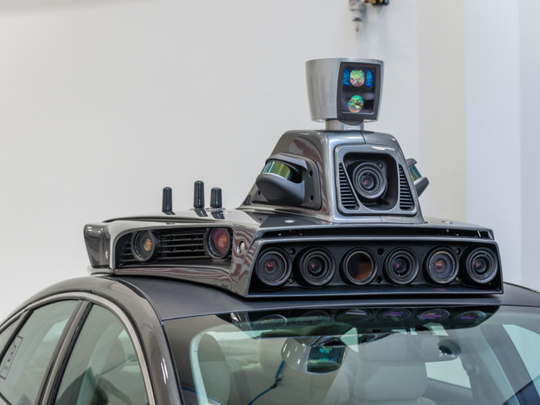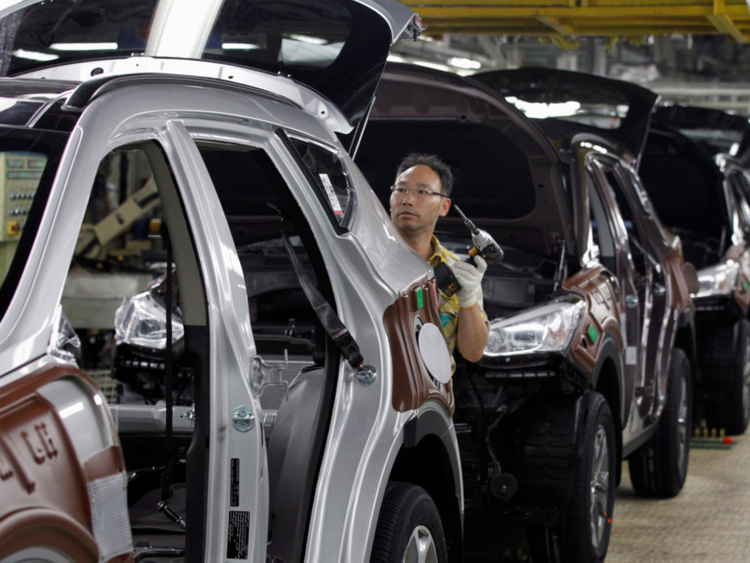
South Korea is racing towards the future of transportation at full speed, and could see driverless cars on its roads as early as 2020.
Joining global technology heavyweights in betting on the automotive market to drive growth, Hyundai Motor and its smaller affiliate Kia Motors, which over the years have been adding driver assists to its vehicles as the building blocks to autonomy, promised to have fully autonomous vehicles on sale by 2030. Generating positive momentum in boosting this segment, Samsung created a team to develop next-generation auto parts for self-driving cars.
By 2025, autonomous cars is expected to create a $42-billion-plus market for the technology, according to Boston Consulting Group.
In March, Hyundai has pledged $2 billion in research through 2018 to help bring these advanced systems into production, after it received a licence from the transport ministry to test its self-driving Genesis sedan on local roads. The vehicle is equipped with traffic-jam assist, highway-driving assist, narrow-passage assist, and can easily be switched to manual mode when needed. Hyundai Motor plans to produce level 2 automation vehicles, in which the vehicle is capable of driving by itself but the driver is still in charge, ready to intervene at all times, by the end of this year.
Expectedly, the first self-driving car licence to Hyundai Genesis has prompted others to follow suit. “We are getting a growing number of inquiries from universities and small businesses about autonomous vehicle licences,” an official from the Ministry of Land, Infrastructure and Transport told The Korea Times.
“We expect more self-driving vehicles will be seen on local roads. The government will allow the vehicles to run on any roads here as long as they don’t pose a threat to other drivers.”
With as many as 40 million people living in urban areas in South Korea, domestic carmakers are under pressure to create technologies that ease gridlock and give motorists stuck in traffic the ability to multitask safely. The transport ministry says autonomous cars would save some $500 billion won in traffic accident costs and cut the number of death tolls on highways by 50 per cent.
Now, according to Maeil Business News Korea, Uber, who wants to partner with Hyundai on the development of self-driving technology in South Korea, is planning to place an order for a huge number of Hyundai vehicles. In June, the ride-hailing giant visited Hyundai’s Namyang research and development facility in Hwaseong.
Earlier this year, giving a glimpse into the future of autonomous public transport, Seoul National University tested a driverless sedan, called Snuber, to transport physically challenged students. Working in conjunction with a hailing app created by the university, the vehicle has been navigating the 44,200 square-foot campus without any accidents so far.
Meanwhile, the country has announced an ambitious plan to build in the next three years a network of smart expressways adapted to self-driving cars. The government will invest $33.1 billion and plans to raise another $31.3 billion through private sector investment to finance the plan. The transport ministry also announced plans to build a new test site for self-driving cars, known as K-city.
As South Korea, the world’s fifth-largest car producer and one of the most advanced countries in information and communication technology, pushes to catch up with global competitors in the promising field, it needs to overcome certain challenges. In a recent report, the Korea Economic Research Institute claimed unnecessary regulations is creating a major hurdle to local developers of self-driving cars, adding to their costs.
Until now, the country’s carmakers are taking self-driving vehicles as far as Arizona in the US to test them because the Seoul government requires at least two safety drivers to be inside a car even when testing a driverless vehicle.
“Most other countries are moving to simplify requirements for test driving autonomous vehicles. Because conducting tests on actual roads is very important for the development of self-driving cars, the country must ease its requirements to allow various tests and research,” the report states.
It also noted a need to turn the country into a regional test bed for autonomous vehicles.
At the moment Hyundai is aiming to ramp up autonomous-driving development in the expansive mobility testing ground being built outside Detroit in the US.
“Advanced evaluation of prototypes will be centred at Hyundai’s California proving ground. But the development of autonomous-driving electronics and the testing of closer-to-market vehicles will gravitate toward Michigan,” says Andy Freels, president of the Hyundai-Kia America Technical Centre.
While it’s no secret that much of the credit for South Korea’s rapid economic development goes to these global behemoths — Samsung Group and Hyundai Group constitute more than 33 per cent of the country’s GDP — it’s going to be a race to the finish as there will be at least ten players publicly experimenting with self-driving technology by 2020.



